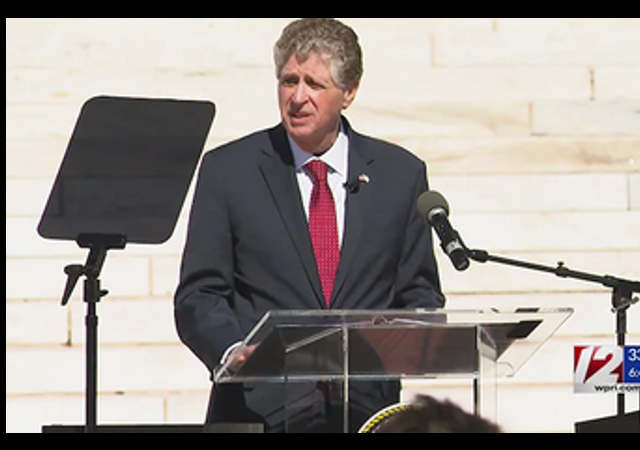Rhode Island to Require Students Attend Financial Literacy Classes
Gov. Dan McKee signed the mandate into law, making Rhode Island the 7th state to adopt such a program.

While Americans fight their school boards across the nation to prevent the implementation of divisive Critical Race Theory curriculum, one state has taken a novel approach of requiring instruction in something exceedingly useful.
The state of Rhode Island will soon require all students at public high schools to pass financial literacy classes before they can graduate.
Earlier this month, Rhode Island Gov. Dan McKee, a Democrat, signed a bill into law that will set statewide standards for classes that will teach students about financial literacy.
According to a press release from the governor’s office, the goal of the law is to educate Rhode Island students on personal finance topics ranging from budgeting, saving, employment and income and money management.
“Financial literacy is key to a young person’s future success,” McKee said in a statement. “…(this legislation will) help us ensure that every Rhode Island high school student is equipped with tools to prepare them for economic opportunity after graduation.”
The bill was signed into law last week and requires the program to be developed by the end of the year.
The law orders standards to be set by the end of 2021 and orders that the classes be offered in public schools by the start of the 2022-2023 school year.
“How can we expect our children to become financially successful adults if we do not teach them the core aspects of our financial system when they are in school?” said Democratic state Sen. Sandra Cano, who chairs the Rhode Island Senate Education Committee. “This bill will ensure that our children leave the public school system with a firm and knowledgeable grasp on basic financial concepts that will help them succeed in their adult lives.”.
Rhode Island joins 6 other states across the country with similar programs.
The new law follows a 2019 Treasury Department report that recommended mandatory financial literacy courses for college students.
In February 2020, CNBC reported that just six states in the U.S. required students to take a stand-alone personal finance class — Alabama, Iowa, North Carolina, Tennessee, Utah and Virginia.
This seems to be a very popular idea with American parents across the nation. Wise politicians would abandon Critical Race Theory for lessons that would benefit the students, the communities, and the nation.
This should be required by all 50 states.
— Nicci Weber (@nweb415) June 18, 2021
Financial literacy should be required curriculum in secondary and higher education. If Rhode Island can require it, New York can, too @NYSEDNews @SUNY @SUNYChancellor let's make it happen https://t.co/yMWjTT0QPt
— Vanessa L Haddad (@VanessaLHaddad) June 18, 2021
Donations tax deductible
to the full extent allowed by law.








Comments
I learned double entry bookkeeping in high school in the 70s, but teach didn’t touch on anything else. He stayed in his lane.
For years, I thought double entry accounting was keeping two sets of books.
Yes, but what I really want to know is: should I trade the family cow for some magic beans?
(OK, so ‘financial literacy’ is not a bad idea, but I have zero confidence public high schools can teach it. Umm, really, compound interest is an exponential function? And how many high school math teachers can actually teach how that works, and what about disparate impact? Although I don’t doubt they can built an impenetrable wall of jaw-cracking edu-talk around the subject, even while avoiding any actual instruction beyond ‘Just Google it.’)
Sounds good. It’d be even better with a bit on practical economics, like the perils of minimum wage laws.
Or the perils of that seventh month after Six Months Same as Cash enticement.
They used to call that home ec, it was an elective, and boys who took it got laughed at. (Boys got shop.) Still, I applaud this.
The cynic in me is waiting for the second shoe, though, especially with the Rhode Island nexus.
Schools should also teach practical gun safety. And no, “just say no” isn’t acceptable gun education any more than it is for sex education.
My daughter took the Virginia course as a summer school class. It’s ok, but it could be much better. It gives the kids a lot of info without providing any real context.
Example: The course will define a 401k in simple terms without explaining anything else to the kids. So at the end of the course, the kids are still unclear what a 401k really is or what that means to them.
It’s better this way. By the time any of these kids could start a 401k, the Democrats will have raided them all for infrastructures and death taxes anyway.
“How can we expect our children to become financially successful adults if we do not teach them the core aspects of our financial system when they are in school?”
Uh, we can expect their parents to step up and do some of the work? I didn’t take a “financial literacy class” and I am financially literate because my parents had conversations with me and taught me what I needed to know.
Working in finance, I had a third year teacher ask me why she was paying for health insurance as she had not enrolled. After looking at her account my first thought was how many years since high school had this person NOT received a paycheck to know that the deduction was for Social Security. The largest number of employees having garnishments on earnings, again teachers. The loudest employees complaining they were not being remunerated enough (NY State), again teachers.
If there is to be a Financial literacy course, first have the teachers take a pass it first.